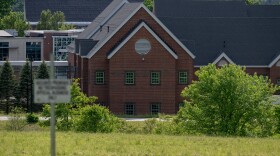With federal priorities set to change under the Trump administration, some Cape Codders are wondering what will happen to the funding for the Bourne and Sagamore bridges.
The cost to replace the narrow, often congested bridges — now nearly 90 years old — has been estimated at $4.5 billion.
Funding for the Sagamore Bridge is essentially complete. The last major piece came in July, with a federal grant of $993 million. But the state is still seeking money for the Bourne Bridge.
Marie Oliva, CEO of the Cape Cod Canal Region Chamber of Commerce, said that while the future is uncertain, she anticipates the Massachusetts Department of Transportation and the region’s congressional delegation will keep working to get the Bourne Bridge funded.
“It remains to be seen what happens,” she said. “I don't think anybody knows at this point, but I see no reason why we shouldn't be moving forward.”
Transportation is a bipartisan issue, she said. “I know there’s a Republican administration, but bridges — it's a safety matter. It's a public safety issue. … That's the key.”
“Hopefully, we've got our representation in Congress, and it'll get done,” she said.
State officials say construction of the Sagamore Bridge is likely to start in 2028 and last six to eight years. Construction of the Bourne Bridge could start while the Sagamore is still underway, but the timing depends on funding.
The new bridges will have wider lanes, dedicated exit lanes, and a path for bikes and pedestrians.
When the largest grant for the Sagamore Bridge was announced in July, Gov. Maura Healey pledged to keep working to get money for the Bourne.
“We're going to rebuild the Sagamore Bridge, and we're going to continue to work for every dollar available to rebuild the Bourne Bridge,” she said.
The state plans to hold a public open house on the bridge project Nov. 18 at the Veterans’ Memorial Community Center in Bourne.
Hours for the open house run from noon to 3 p.m. and 5 to 8 p.m.





